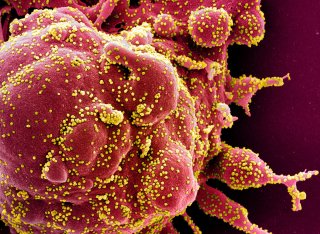Professor: Thanksgiving Is "The Perfect Storm" for Coronavirus Transmission
“I am very worried about people disregarding CDC’s warning about traveling around Thanksgiving. It’s the perfect storm for transmission,” Dr. Jill Foster, a professor at the University of Minnesota Medical School, told The National Interest.
With coronavirus deaths, new cases, and hospitalizations rising rapidly across the United States, some medical experts are calling the upcoming Thanksgiving holiday a “perfect storm for transmission.”
“I am very worried about people disregarding CDC’s warning about traveling around Thanksgiving. It’s the perfect storm for transmission,” Dr. Jill Foster, a professor at the University of Minnesota Medical School, told The National Interest.
“People will be mixing geographically from areas of high prevalence to low prevalence. Travel is fraught with not being able to social distance—crowded lines at rest stops if traveling by car or at airports, train stations, and on the plane, train, or bus itself. And then at the site of holiday gatherings, people naturally let their guard down by over overestimating their safety among familiar people who they love.”
From last Friday to Sunday, more than three million people passed through airport security checkpoints across the country, according to the Transportation Security Administration (TSA), which amounted to a record weekend for air travel since the ongoing coronavirus pandemic struck in early spring. The last day to see more than one million people screened by TSA was on March 16.
Millions are hitting the highways as well in order to celebrate the holiday with their loved ones. The American Automobile Association has forecast that roughly forty-five million to fifty million people will drive their automobiles over Thanksgiving, compared to fifty-five million last year.
Dr. Henry Walke, the Centers for Disease Control and Prevention’s COVID-19 incident manager, noted in a briefing that the agency is “alarmed” by the “exponential increase in cases and hospitalizations and deaths” caused by the coronavirus. He added that packed “transportation hubs” could drive even more spread in many states.
Dr. Iahn Gonsenhauser, chief quality and patient safety officer at the Ohio State University Wexner Medical Center, admitted that he is “very concerned that a large part of the population is minimizing the risk associated with traveling and getting together with non-household contacts” for the holiday.
“Based on what I am seeing in airports across the nation and the loud cohort that is rejecting public health recommendations, one would expect that the current, already critical surge of new infections and hospitalizations will accelerate after the holiday,” he told TNI.
There are nearly ninety thousand people currently hospitalized with COVID-19, a new record since the pandemic began roughly nine months ago, according to the COVID Tracking Project.
Hospital systems in many regions around the country have been sounding the alarm that their staffing and intensive-care unit bed capacity are being stretched thin. Data recently published by the Department of Health and Human Services revealed that about 20 percent of U.S. hospitals faced or expected to face a staffing shortage last week.
Even with the grim numbers, Foster believes that many could potentially let their guard down this Thanksgiving.
“It’s perfectly understandable with all that has been stressful in 2020 to crave the intimacy and comfort of loved ones and to just try to take a break from everything for a few days. However, taking risk means also taking the responsibility of having a follow-up plan,” she said.
“There’s no shame in (testing) positive, but there is blame for not helping with control. When the health department calls, give the information they need to put the puzzle together. They are trying to make good recommendations to come up with big solutions but can only do that with good information.”
Ethen Kim Lieser is a Minneapolis-based Science and Tech Editor who has held posts at Google, The Korea Herald, Lincoln Journal Star, AsianWeek, and Arirang TV. Follow or contact him on LinkedIn.

